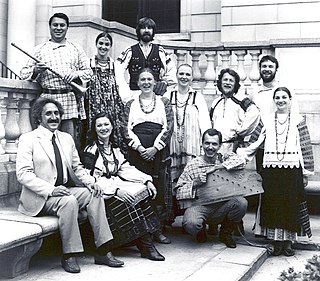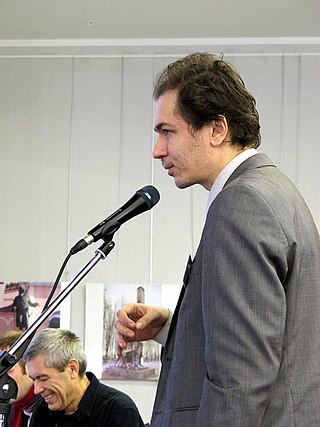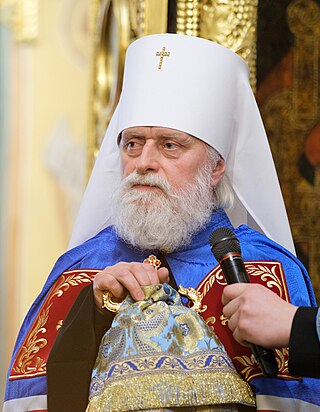
The balalaika is a Russian stringed musical instrument with a characteristic triangular wooden, hollow body, fretted neck, and three strings. Two strings are usually tuned to the same note and the third string is a perfect fourth higher. The higher-pitched balalaikas are used to play melodies and chords. The instrument generally has a short sustain, necessitating rapid strumming or plucking when it is used to play melodies. Balalaikas are often used for Russian folk music and dancing.

Kumyks are a Turkic ethnic group living in Dagestan, Chechnya and North Ossetia. They are the largest Turkic people in the North Caucasus.

Mikhail Sergeyevich Boyarsky is a Russian actor and singer. He is best known for playing swashbucklers in historical adventure films; the role of d'Artagnan in the 1978 Soviet adaptation of Alexander Dumas' Three Musketeers elevated Boyarsky to the nationwide fame.

Julian Alexandrovich Scriabin was a Swiss-born Russian composer and pianist who was the youngest son of Alexander Scriabin and Tatiana de Schloezer.

Yuri Nikolaevich Kholopov was a Russian musicologist and educator.

Olexander Chyrkov, the head of the department of Germanic Philology and Foreign Literature, the head of Scientific and Artistic Complex "Dramaturgy" of the Institute of Foreign Languages Zhytomyr Ivan Franko State University, member of the Academy of Sciences of Higher Education of Ukraine, Doctor of Philology, Professor.

Throughout the early Middle Ages, the Rurikid knyazes of the Kievan Rus' used unique symbols to denote property rights over various items. They are depicted on punches, seals, and coins of the Rurikids. In contrast to Western European heraldry, where coats of arms belonged to entire families, or were inherited without changes by firstborn sons, Rurikid symbols were personal, with every knyaz devising an emblem of their own for themselves.

The Dmitri Pokrovsky Ensemble was founded by Dmitri Pokrovsky (1944–1996) together with his wife and lifelong partner, Tamara Smyslova, in Moscow in 1973 as an experimental singing group under folk Commission of the URSS Сomposers Union.The appearance of this team completely changed in modern society the understanding and view of folklore. For the first time in this Ensemble came together scientific approach to the study of folklore and brilliant stage presentation of it. Professional musicians belonging to the city culture had to master a large number very dissimilar styles of Russian village music. The Pokrovsky Ensemble became the first professional group which began to study the Russian folk music from authentic village musicians in numerous folklore expeditions. Participants in the Pokrovsky Ensemble recorded, learned and then performed in very different traditions, styles and manners of folk singing, playing and dancing, trying to penetrate to the rules of its existence, understand the laws of its development. Dmitri Pokrovsky was one of the first musicians who tried to bridge the gap between old and new music. The credo of The Pokrovsky Ensemble is that Russian traditional folk music is a living treasure of Russian culture and is the basis for all classical and contemporary Russian music. The Pokrovsky Ensemble became the starting point in the search for new ways to stage implementation of folk music and marked the beginning of a Russian wave in world music.
Armenian folk music is a genre of Armenian music. It usually uses the duduk, the kemenche, and the oud. It is very similar to folk music in the Caucasus and shares many similar songs and traditions with countries around Armenia, namely Georgia and Azerbaijan.
Ion S. Melnik was a Russian and Soviet era composer. His compositions include songs, choruses, instrumental music, and music to documentary films.
Vladimir Semionovich Spirin was a Russian philologist, sinologist, historian, primarily interested resided in classical Chinese philology and Chinese philosophy. Throughout his career he was a lecturer of Saint Petersburg State University, researcher at Saint Petersburg's branch of the Institute of Oriental Studies of the Russian Academy of Sciences, Saint Petersburg Russia, Candidate of Sciences.

Andriy Ihorovych Bondarenko is a Ukrainian composer and pianist.

Metropolitan Eugene is a bishop of the Russian Orthodox Church, Metropolitan of Tallinn and All Estonia and primate of the Estonian Orthodox Church of the Moscow Patriarchate, former rector of Moscow Theological Academy (1995–2018) and Chairman of the Educational Committee of the Holy Synod (1994–2018). After on January 18, 2024, Estonia announced that it would not renew Reshetnikov's residence permit Reshetnikov left Estonia on February 6, 2024. His residence permit was evoked because he was assessed to be a security risk due to his justification of Russia’s invasion of Ukraine and his defense of the Russian government.

Gyuli Nizamievna Kambarova is a Dagestan and Russian composer who is a member of the Union of Composers of Russian Federation, member of the International Alliance for Women in Music, member of the Music Teachers National Association, and member of the Songwriters Guild of America. She authored the music for the documentaries "You Are Not Alone", "Voice for the Voiceless" and Fine Line directed by Anna Barsukova. She lives and works in United States.

Mikhail Semyonovich Kazinik is a music lecturer, teacher, television and radio presenter, and a popularizer of classical music.
Arts of Ukraine is a collection of all works of art created during the entire history of Ukraine's development.

Zhanna Yuhymivna Kolodub is a celebrated Ukrainian composer and teacher.
Anton Aleksandrovich Tabala, better known as HOMIE, is a Belarusian singer, songwriter and rapper.

Serhii Oleksiyovych Buhoslavskyi was a Russian Imperial and Soviet literary historian, musicologist and composer from present-day Ukraine. Buhoslavskyi is known for his work on textual criticism of the Primary Chronicle.
Yevchenko Kasyan was a Ukrainian musician, master of folk instruments, director of the ensembles "Guk", "Guchok" and "Guchenia", soloist of the Veryovka Ukrainian Folk Choir.













